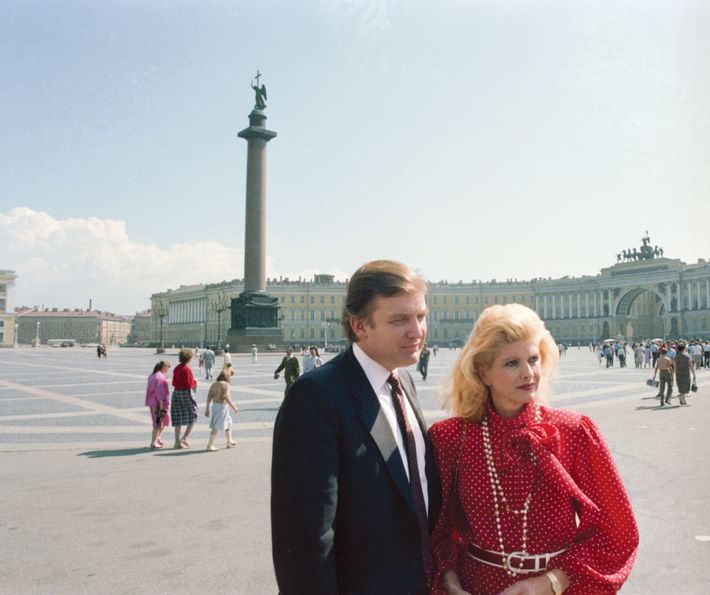General Discussion
Related: Editorials & Other Articles, Issue Forums, Alliance Forums, Region ForumsHow long has Putin been controlling Trump?
Clearly he was already under Putin's control when elected in 2016. But how far back does this go?
dalton99a
(92,858 posts)What changed that year? One possible explanation is that Trump published The Art of the Deal, which sped up his transformation from an aggressive, publicity-seeking New York developer to a national symbol of capitalism. But the timing for this account does not line up perfectly — the book came out on November 1, and Trump had begun opining loudly on trade and international politics two months earlier. The other important event from that year is that Trump visited Moscow.
During the Soviet era, Russian intelligence cast a wide net to gain leverage over influential figures abroad. (The practice continues to this day.) The Russians would lure or entrap not only prominent politicians and cultural leaders, but also people whom they saw as having the potential for gaining prominence in the future. In 1986, Soviet ambassador Yuri Dubinin met Trump in New York, flattered him with praise for his building exploits, and invited him to discuss a building in Moscow. Trump visited Moscow in July 1987. He stayed at the National Hotel, in the Lenin Suite, which certainly would have been bugged. There is not much else in the public record to describe his visit, except Trump’s own recollection in The Art of the Deal that Soviet officials were eager for him to build a hotel there. (It never happened.)
Trump returned from Moscow fired up with political ambition. He began the first of a long series of presidential flirtations, which included a flashy trip to New Hampshire. Two months after his Moscow visit, Trump spent almost $100,000 on a series of full-page newspaper ads that published a political manifesto. “An open letter from Donald J. Trump on why America should stop paying to defend countries that can afford to defend themselves,” as Trump labeled it, launched angry populist charges against the allies that benefited from the umbrella of American military protection. “Why are these nations not paying the United States for the human lives and billions of dollars we are losing to protect their interests?”

1987: Donald and Ivana Trump visiting Palace Square in Saint Petersburg after their trip to Moscow. Photo: Maxim Blokhin/TASS via Getty Images
milestogo
(22,806 posts)underpants
(195,609 posts)BOOKS OF THE TIMES
‘Putin’s People’ Documents the Ruthless and Relentless Reach of Kremlin Corruption
By Jennifer Szalai
July 16, 2020
But more mercenary motives were at play, too. Western business interests recognized how much profit could be made off of Russian oil behemoths and the giant sums of money sloshing around. (Unsurprisingly, Deutsche Bank — an institution at the center of many scandals — has occupied a crucial role.) Even when Putin was the beneficiary of such arrangements, he was contemptuous of them; his ability to use Western companies to Russia’s advantage only confirmed his long-held view “that anyone in the West could be bought.”
“Putin’s People” ends with a chapter on Donald Trump, and what Belton calls the “network of Russian intelligence operatives, tycoons and organized-crime associates” that has encircled him since the early ’90s. The fact that Trump was frequently overwhelmed by debt provided an opportunity to those who had the cash he desperately needed. Belton documents how the network used high-end real estate deals to launder money while evading stricter banking regulations after 9/11. She’s agnostic on whether Trump was a witting accomplice who was aware of how he was being used. As one former executive from the Trump Organization put it, “Donald doesn’t do due diligence.”
https://www.nytimes.com/2020/07/16/books/review-putins-people-kgb-catherine-belton.html
empedocles
(15,751 posts)dalton99a
(92,858 posts)As central as Putin is to the narrative, he mostly appears as a shadowy figure — not particularly creative or charismatic, but cannily able, like the K.G.B. agent he once was, to mirror people’s expectations back to them. The people who facilitated Putin’s rise didn’t do so for particularly idealistic reasons. An ailing Boris Yeltsin and the oligarchs who thrived in the chaos after the collapse of the Soviet Union were looking for someone who would preserve their wealth and protect them from corruption charges. Putin presented himself as someone who would honor the bargain, but then replaced any Yeltsin-era players who dared to challenge his tightening grip on power with loyalists he could call his own.
“Putin’s People” tells the story of a number of figures who eventually ran afoul of the president’s regime. Media moguls like Boris Berezovsky and Vladimir Gusinsky were stripped of their empires and fled the country. Belton says the real turning point was the 2004 trial that sent Mikhail Khodorkovsky — at one point Russia’s richest man, with a controlling stake in the oil producer Yukos — to a Siberian prison camp for 10 years. Putin has since presided over the country and its resources like a czar, Belton writes, bolstered by a cadre of friendly oligarchs and secret service agents. Russia’s legal system was turned into a weapon and a fig leaf.
Putin allowed and even encouraged the oligarchs to accrue vast personal fortunes, but they were also expected to siphon some money from their business ventures into the obschak, a collective kitty whose slush funds, Belton says, have been useful in projecting the image of a powerful Russia on the world stage. The Kremlin’s abiding definition of power was cramped and zero-sum; the resources were plowed into undermining other countries on the relative cheap, by funding troll farms, election meddling and extremist movements.
